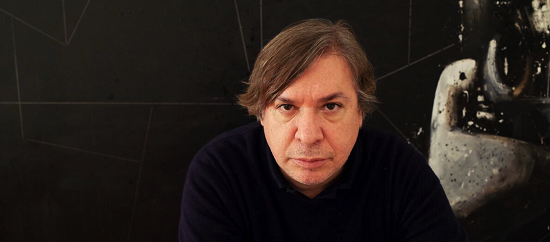THIS WEEK’S MUSE
GEORGE CONDO

“The only way for me to feel the difference between every other artist and me is to use every artist to become me.”
George Condo has occupied a central position in the landscape of American painting for nearly forty years, his unique style mixing traditional classical European painting with a contemporary twist informed by American modernism.
Condo was born in 1957 in Concord, capital city of New Hampshire. As a young art student in late-70s—studying art history and music theory at the University of Massachusetts Lowell—he met fellow artist Jean-Michel Basquiat on a trip to New York. It led to a close friendship, and he settled there in the early 1980s, taking a residency at Andy Warhol’s Factory.
Between 1985 and 1995 Condo spent much of his time in Europe, living in Cologne and Paris. It was during this period he developed his artistic identity and hallmark style. Condo’s approach was to combine the styles of Cubism, Surrealism, and other avant-garde movements with cartoon-like characters and figurative imagery which the artist defined as ‘artificial realism.’
I try to depict a character’s train of thoughts simultaneously – hysteria, joy, sadness, desperation. If you could see these things at once that would be like what I’m trying to make you see in my art.”
With Jean-Michel Basquiat and others, Condo led the charge of an international revival of painting. His work marked a triumphant return—in North America at least—to a medium that had become seen as stale in the previous decade.
Throughout his career, as well as influencing a generation of artists, Condo’s work has inspired many contemporary writers including Burroughs, Guattari, Demosthenes Davvetas, Donald Kuspit, Wilfried Dickhoff, and Salman Rushdie, whose 2001 novel Fury includes a chapter inspired by Condo’s 1994 oil painting The Psychoanalytic Puppeteer Losing His Mind.
“I describe what I do as psychological cubism,” says Condo. “Picasso painted a violin from four different perspectives at one moment. I do the same with psychological states.”
His work is inhabited by misshapen and distorted characters. Macabre distortions that inhabit a place where Francis Bacon and Otto Dix collide, but where they see despair and anguish, he instead sees humor and absurdity. Bulging eyes, bulbous cheeks, and twisted limbs build up his unique figures, fusing caricature with classic human form. Each is held in a state of metamorphosis, each reflects multiple emotions and gestures within a single form.
“[My figures] speak to our generation, they speak to the idea of multiple channels of communication, multiple personalities, multiple emotions, multiple [ways to] access information, all at the same time,”
HAPPENINGS

Friday, September 23, from 1–3pm
Cooking with Agatha: Okonomiyake & Edamame Salad
An easy version of the popular Japanese vegetable pancake!
$43 – Member, $47 – Non-Member
DETAILS & TICKETS
